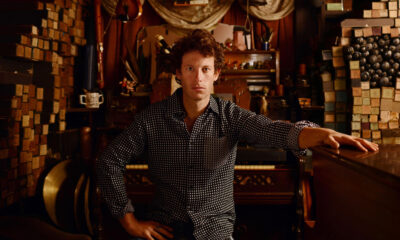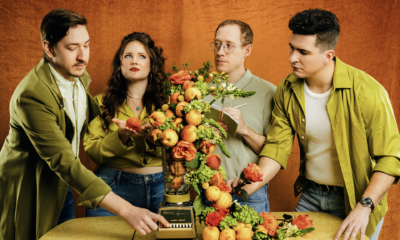Interviews
Interview with Carla Harvey; Butcher Babies Vocalist Discusses Her First Book ‘Death and Other Dances’ in Great Detail
When she was a seven-year-old girl in Detroit, little Carla Harvey dreamed of being a showgirl. While generally not the career trajectory of most girls that age, Harvey’s ambition might have been seen as normal, given the set of circumstances of her formative years.

When she was a seven-year-old girl in Detroit, little Carla Harvey dreamed of being a showgirl. While generally not the career trajectory of most girls that age, Harvey’s ambition might have been seen as normal, given the set of circumstances of her formative years.
In the new, semi-autobiographical book ‘Death and Other Dances,’ Butcher Babies vocalist Carla Harvey brings the reader into the pandemonium of her dark past and out to a life of purpose and contentment.
“I’ve always liked reading,” Harvey says, sitting outside of a coffee shop near her Los Angeles home. Wearing a sundress with minimal makeup, she bears little resemblance to her toothsome Butcher Babies persona, though her black riding boots reek metal au courant. “When I was a kid I had no friends. I was a chubby, introverted kid and stayed in the room all by myself. And I loved comic books and literature and heavy metal. So I was basically holed up in my room with Pantera or old school Metallica blaring, reading books. I knew that I always wanted to write a book.”

Harvey’s motivation for writing ‘Death and Other Dances’ wasn’t aimed at profit or self-aggrandizement. “I wrote this book for myself. And I hope that it helps young girls or young guys who are maybe struggling with some of the same issues that I’ve struggled with in my life.” By going back to the beginning, neither withholding truth nor embellishing, Harvey wrote her story. “It was incredibly cathartic. Obviously, when you dig in to yourself to write, you’re faced with who you are and what you are and really look at it.”
It is an old adage that we are as sick as our secrets. While horrific accounts permeate many of the pages in Harvey’s book, her memoir transforms after the desperate decision to jettison her pain. “I was worried that people would think that I was an awful person because of the things I wrote, but actually I’ve had nothing but great feedback, especially from women who say ‘I can’t believe that you felt that way. I felt that way, too.’ And it’s funny, because I had a publishing company who deals with women authors and they wanted me to make my book more Oprah’s Book Club-friendly and more relatable to the average woman before they wanted to explore publishing it. I thought about it and I was like, ‘All right. What can I change?’ And then I thought about it: I was a stripper. I was a mortician. A rock star. I can’t really tell my story any differently or make it more relatable to a person. If a person can’t relate to the common feelings of alienation and loneliness that I put through the book, then they just don’t get what I’m trying to say.”
Harvey continues: “Then the other publishing companies I went to said they wanted to wait until my band got bigger to publish the book. And that was the wrong approach as well. This is not a book about me being in the Butcher Babies. It has nothing to do with the Butcher Babies. I would have written this book regardless. I just wanted to write a book. That bothered me too, that people would think that I had written it just because I’m in a band, which is why I wanted to get it out now. I wanted to get it out before we were bigger, not after we were bigger, so that some publishing company could make money off of me. I think that’s silly.”

‘Death and Other Dances’ is a life after death story. “There’s no reason I should be touring around the world with my heavy metal band right now. Between the people that I associated myself with, and all the drugs that I did, I shouldn’t be here doing this right now. I stopped just in time and I take very good care of myself now.”
Harvey believes that people will be inspired by her story, particularly women. “I think a lot of women give up on their dreams for a guy, or because they think that they can’t do it, or they’re too old, or too whatever the case may be. They (can) take away inspiration in knowing that they can do it, no matter what the odds are against them. I’m a factory worker’s kid from Detroit. I was a little girl with a dream; a fat, bucktoothed kid with a dream who was really determined to get it, no matter what the cost. I think that you should never be afraid of the past. You should embrace it and take all the little pieces, even all the bullshit that you’ve done, and use that to create a great future.”
“With writing the book, what I wanted to touch on was human connection and how important it is to get that in our lives. When I was writing it I didn’t know that it was going to be such a book about me and my issues. Obviously, when I wrote it, I didn’t think that my issues were that significant. Or, you don’t ever think of them in that realm. But I guess it became a story of how it’s never too late to become the person that you wanted to be.”
Check out the song “They’re Coming To Take Me Away, Ha-Haaa!”
-

 Hardcore/Punk5 days ago
Hardcore/Punk5 days agoHastings Beat Punks Kid Kapichi Vent Their Frustrations at Leeds Beckett University [Photos]
-

 Culture6 days ago
Culture6 days agoCirque Du Soleil OVO Takes Leeds Fans on a Unique, Unforgettable Journey [Photos]
-

 Alternative/Rock4 days ago
Alternative/Rock4 days agoA Rejuvenated Dream State are ‘Still Dreaming’ as They Bounce Into Manchester YES [Photos]
-
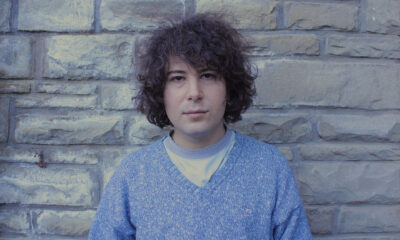
 Indie7 days ago
Indie7 days agoMichele Ducci Premieres Bouncy New Single “You Lay the Path by Walking on it”
-

 Culture5 hours ago
Culture5 hours agoDan Carter & George Miller Chat Foodinati Live, Heavy Metal Charities and Pre-Gig Meals
-
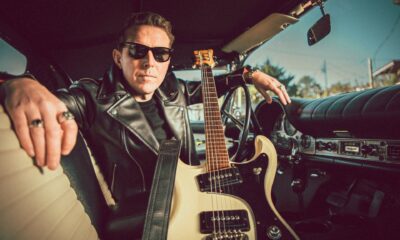
 Alternative/Rock1 week ago
Alternative/Rock1 week agoWilliam Edward Thompson Premieres His Stripped-Down “Sleep Test” Music Video
-
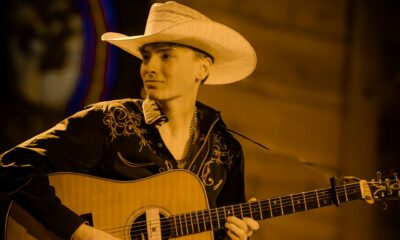
 Country1 week ago
Country1 week agoJayce Turley Reflects on “Misery” with the Premiere of His New Single
-
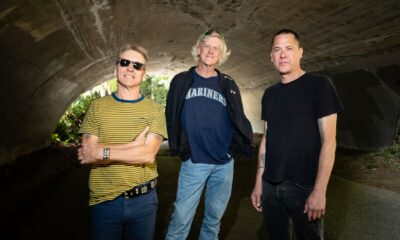
 Hardcore/Punk6 days ago
Hardcore/Punk6 days agoSpiders from Uranus Premieres Their Debut Album ‘Blow It Out!’


